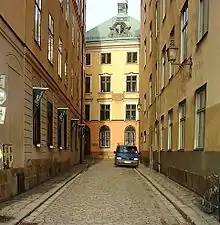Gaffelgränd
Gaffelgränd is an alley in Gamla stan, the old town of Stockholm, Sweden, connecting Skeppsbron to Lilla Hoparegränd and Pelikansgränd, both of which are leading to Österlånggatan. It is a parallel street to Ferkens Gränd, Lilla Hoparegränd, Pelikansgränd, and Johannesgränd.

History
The alley appears in historical records as Hopare Gränden in 1700, Gaffelgränden in 1720, and gafwel gränden in 1720. It came to being as the old city wall was demolished and Skeppsbron projected in the 1630s. The alleys leading east from Österlånggatan were then extended down to the new quay, of unknown reason with the exception of Lilla Hoparegränd and Pelikangränd. The two corner houses flanking Gaffelgränd were built instead, probably before 1647, and the alley created as a result.[1]
Etymology
The origin of the name is not entirely clear. In its old form (1720), Gavelgränd ("Gable Alley"), it might refer to the gable in the western end of the street viewable from Skeppsbron; or, as on a map dated 1733 and as its modern name implies, Gaffelgränd ("Fork Alley") might refer to the fork-like structure formed by the three alleys.[1]
In culture
In the dedications in his epistles, the troubadour Carl Michael Bellman (1740–1795), still popular for his devotion to wine and women, mentions the alley twice, or rather a tavern in it:[1]
- In Epistle 5:
- Till the trogne bröder på Terra Nova i Gaffelgränden
- To the faithful brothers at 'Terra Nova' in The Fork Alley
- Till gubbarna på Terra Nova i Gaffelgränden vid Skeppsbron
- To the old men at 'Terra Nova' in The Fork Alley at Skeppsbron
The alley's reputation is reconfirmed a century later by the poet Anna Maria Lenngren (1754–1817). When paraphrasing Charles-François Panard's (1689–1765) Les merveilles de l'Opéra in her parody Operan ("The Opera"), she makes ironic use of Gaffelgränd:[2]
| Panard | |
|---|---|
|
J'ai vu l'aimable Cythérée
|
I've seen the amiable from Kythera
|
| Lenngren | |
|
Jag sett Cythérens drottning fara
|
I've seen the Queen of Kythera leave
|
References
- "Innerstaden: Gamla stan". Stockholms gatunamn (2nd ed.). Stockholm: Kommittén för Stockholmsforskning. 1992. pp. 53–54. ISBN 91-7031-042-4.
- Warburg, Karl (1917). "Anna Maria Lenngren". Project Runeberg. Retrieved 2007-01-19.